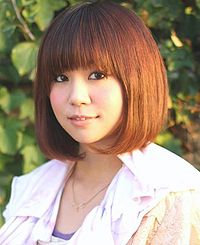Difference between revisions of "Hoshimura Mai"
FoxxyFuyumi (talk | contribs) |
|||
| Line 1: | Line 1: | ||
| − | [[Image: | + | [[Image:evergreenMAIpromo.jpg|thumb|300px|Hoshimura Mai promoting ''[[Evergreen (Hoshimura Mai)|evergreen]]'' (2012)]] |
| − | + | [[category:Hoshimura Mai Images]] [[category:Promo Images]] | |
<div align="justify"> | <div align="justify"> | ||
| − | '''Hoshimura Mai''' (星村麻衣) is a [[J-Pop|Japanese pop]] | + | '''Hoshimura Mai''' (星村麻衣) is a [[J-Pop|Japanese pop]]-[[J-Rock|rock]] singer under [[Heart-Voice Records]]. She writes her own lyrics and composes her own music. Her style can be described as "piano-pop/rock". Hoshimura is also known for assuming a crouching stance while playing the piano. |
==Profile== | ==Profile== | ||
* '''Name:''' Hoshimura Mai (星村麻衣) | * '''Name:''' Hoshimura Mai (星村麻衣) | ||
* '''Birthdate:''' April 18th, 1981 | * '''Birthdate:''' April 18th, 1981 | ||
| − | * '''Birthplace:''' | + | * '''Birthplace:''' [[wikipedia:Shimame Prefecture|Shimane Prefecture]], [[Japan]] |
| + | * '''[[Blood Type]]''': AB | ||
* '''Instrument''': Piano | * '''Instrument''': Piano | ||
| Line 14: | Line 15: | ||
[[Image:2003souppromo.jpg|thumb|200px|Hoshimura promoting ''[[Soup (Hoshimura Mai)|SOUP]]'' (2003)]] | [[Image:2003souppromo.jpg|thumb|200px|Hoshimura promoting ''[[Soup (Hoshimura Mai)|SOUP]]'' (2003)]] | ||
| − | Hoshimura Mai was born in [[wikipedia:Shimane Prefecture|Shimane Prefecture]] and | + | Hoshimura Mai was born in [[wikipedia:Shimane Prefecture|Shimane Prefecture]] and majored in piano. She began playing when she was just four years old and considers the piano her friend. Her parents are both school teachers and were important to her development as a musician. Hoshimura's mother wanted her to become a classical musician while her father influenced her with his fondness for pop music (he played guitar in a pop-style band). |
During high school, Hoshimura set her sights on becoming a singer-songwriter. She also developed a preference for pop-rock over classical music. One day, Hoshimura learned of a [[Sony Music Entertainment|Sony Records]] vocalist audition on the Internet and submitted a demonstration tape. Although she passed the initial screening, she did not make the final cut since she was unable to attend an in-person audition because of her exams. Hoshimura did not give up however, and so she tried once again and passed. She released her debut indies single "[[Natsuiro no Canvas]]" in 2002. | During high school, Hoshimura set her sights on becoming a singer-songwriter. She also developed a preference for pop-rock over classical music. One day, Hoshimura learned of a [[Sony Music Entertainment|Sony Records]] vocalist audition on the Internet and submitted a demonstration tape. Although she passed the initial screening, she did not make the final cut since she was unable to attend an in-person audition because of her exams. Hoshimura did not give up however, and so she tried once again and passed. She released her debut indies single "[[Natsuiro no Canvas]]" in 2002. | ||
| − | [[Image: | + | [[Image:HIMAWARIMAIPROMO.png|thumb|200px|left|Hoshimura promoting "[[Himawari (Hoshimura Mai)|Himawari]] (2004)]]" |
===Going Major=== | ===Going Major=== | ||
| − | Soon after the release of her indie debut, Hoshimura went major after being offered a record deal with [[Sony Music Entertainment]]. She made her major debut with the single, "[[Stay with You|Stay With You]]". She later released two more singles: [[Cherish (Hoshimura Mai)|Cherish]], which reached #125 on the [[Oricon]] and the more successful "[[Get Happy|GET HAPPY]]". "GET HAPPY" was used as | + | Soon after the release of her indie debut, Hoshimura went major after being offered a record deal with [[Sony Music Entertainment]]. She made her major debut with the single, "[[Stay with You|Stay With You]]". She later released two more singles: "[[Cherish (Hoshimura Mai)|Cherish]]", which reached #125 on the [[Oricon]] and the more successful "[[Get Happy|GET HAPPY]]". "[[Get Happy|GET HAPPY]]" was used as the theme song for the [[dorama|drama]] [http://wiki.d-addicts.com/Marusa!! ''Marusa!!''], and reached #24 on the [[Oricon]] charts. |
In 2005, "[[Melodea]]" is released and it marked the beginning of a notable change in Mai's music. With this single, though her vocals were still strong, Mai's compositions were much softer and subdued when compared to the upfront power and punch of her trademark 'piano-rock' sound. The following singles ("[[Every (Hoshimura Mai)|EVERY]]", "[[Sunao ni Narenai]]", "[[Merry Go Round (Hoshimura Mai)|Merry Go Round]]") led up to her second studio album, "[[Joyful]]". The album did worse than her debut album, "[[Soup (Hoshimura Mai)|SOUP]]", ranking at #60 on the Oricon charts. | In 2005, "[[Melodea]]" is released and it marked the beginning of a notable change in Mai's music. With this single, though her vocals were still strong, Mai's compositions were much softer and subdued when compared to the upfront power and punch of her trademark 'piano-rock' sound. The following singles ("[[Every (Hoshimura Mai)|EVERY]]", "[[Sunao ni Narenai]]", "[[Merry Go Round (Hoshimura Mai)|Merry Go Round]]") led up to her second studio album, "[[Joyful]]". The album did worse than her debut album, "[[Soup (Hoshimura Mai)|SOUP]]", ranking at #60 on the Oricon charts. | ||
[[Image:2005Sunao ni Narenaipromo.jpg|thumb|200px|Hoshimura Mai promoting "[[Sunao ni Narenai]]" (2005)]] | [[Image:2005Sunao ni Narenaipromo.jpg|thumb|200px|Hoshimura Mai promoting "[[Sunao ni Narenai]]" (2005)]] | ||
| − | |||
| − | |||
| − | |||
| − | |||
| − | In 2007, Hoshimura started to rise to fame. "[[Sakura Biyori]]" was the tenth ending theme of the anime [[BLEACH (manga)|BLEACH]], ranking #20 on Oricon | + | In 2007, Hoshimura started to rise to fame. "[[Sakura Biyori]]" was the tenth ending theme of the anime ''[[BLEACH (manga)|BLEACH]]'', ranking #20 on the [[Oricon]] weekly charts. Her follow-up single, "[[Shunkan, Strobe.]]", failed to make the same impact. |
| − | On June 4th, 2008 Hoshimura made another hit, this time with "[[Regret|regret]]". The track was the seventh ending song of the anime [[Wikipedia:D. Gray-man| | + | On June 4th, 2008 Hoshimura made another hit, this time with "[[Regret|regret]]". The track was the seventh ending song of the anime ''[[Wikipedia:D. Gray-man|D. Gray-man]]'', ranking #30 on the [[Oricon]] weekly charts and selling 6,313 units totally. In the same year, Hoshimura released her most successful single to date, "[[Hikari (Hoshimura Mai)|Hikari]]", the theme song for the [[dorama|drama]] [http://www.tbs.co.jp/Tomorrow2008/ ''Tomorrow -Hi wa Mata Noboru-'']. The single reached #14 on the [[Oricon]] weekly charts, charted for 8 weeks and sold 21,313 units totally. After all success, Hoshimura released her third album entitled ''[[My Life (Hoshimura Mai)|MY LIFE]]'' and it's also her most successful album to date, ranking #20 on the [[Oricon]] weekly charts. |
===Leaving Sony=== | ===Leaving Sony=== | ||
| − | In 2009, Hoshimura Mai along with [[the brilliant green]] and [[Sowelu]], announced their departure from management agency [[Ken- | + | In 2009, Hoshimura Mai along with [[the brilliant green]] and [[Sowelu]], announced their departure from management agency [[Ken-On]] and record label [[Sony Music Entertainment]]. Before she left, Hoshimura still released a best album entitled ''[[Piano & Best|PIANO & BEST]]''. The collection consists of two discs: one features tunes sung to her own piano accompaniment, while the other includes all of her singles to date. The DVD contains a live concert footage of her Shibuya 2008.10.30 live. After the album's release, Hoshimura reportedly plans to hold several free concerts throughout Japan. |
</div> | </div> | ||
==Discography== | ==Discography== | ||
| + | [[Image:2006joyfulpromo.jpg|thumb|200px|Hoshimura promoting ''[[Joyful]]'' (2006)]] | ||
| + | [[Image:2007strobepromo.jpg|thumb|200px|Hoshimura promoting "[[Shunkan, Strobe.]]" (2007)]] | ||
| + | [[Image:Hoshimura Mai - MY LIFE Promo.jpg|thumb|200px|Hoshimura promoting ''[[My Life (Hoshimura Mai)|MY LIFE]]'' (2008)]] | ||
| + | [[Image:pianobestpromo.jpg|thumb|200px|Hoshimura Mai promoting ''[[Piano & Best|PIANO & BEST]]'' (2009)]] | ||
| + | [[Image:HOSHIMURAMAI2010.jpg|thumb|200px|Hoshimura Mai (2010)]] | ||
| + | |||
===Albums=== | ===Albums=== | ||
* [2003.07.09] [[Soup (Hoshimura Mai)|SOUP]] | * [2003.07.09] [[Soup (Hoshimura Mai)|SOUP]] | ||
* [2006.01.25] [[Joyful]] | * [2006.01.25] [[Joyful]] | ||
* [2008.09.17] [[My Life (Hoshimura Mai)|MY LIFE]] | * [2008.09.17] [[My Life (Hoshimura Mai)|MY LIFE]] | ||
| − | * [2009.03.11] [[Piano & Best|PIANO & BEST]] | + | * [2012.04.18] [[Evergreen (Hoshimura Mai)|evergreen]] (indies) |
| + | |||
| + | ===Best Albums=== | ||
| + | * [2009.03.11] [[Piano & Best|PIANO & BEST]] | ||
| + | |||
| + | ===Mini-Albums=== | ||
* [2010.12.01] [[Kyou ga Egao de Aru You ni]] (今日が笑顔であるように) | * [2010.12.01] [[Kyou ga Egao de Aru You ni]] (今日が笑顔であるように) | ||
| Line 66: | Line 74: | ||
* [2010.03.10] [[Ichibanboshi (Hoshimura Mai)|Ichibanboshi]] (いちばん星; ''First Star To Appear In The Evening'') (indies) | * [2010.03.10] [[Ichibanboshi (Hoshimura Mai)|Ichibanboshi]] (いちばん星; ''First Star To Appear In The Evening'') (indies) | ||
* [2010.07.29] [[Candy (Hoshimura Mai)|Candy]] (indies) | * [2010.07.29] [[Candy (Hoshimura Mai)|Candy]] (indies) | ||
| − | * [2011.06.08] [[Doki Doki (Hoshimura Mai)| | + | * [2011.06.08] [[Doki Doki / You|Doki Doki / YOU]] (indies) |
| + | |||
| + | ===Analog=== | ||
| + | * [2005.04.06] [[Melodea]] | ||
| + | * [2005.06.08] [[Every (Hoshimura Mai)|EVERY]] | ||
| + | * [2005.09.28] [[Sunao ni Narenai]] (素直になれない; ''I Cannot Be Honest'') | ||
===Compilations / Other=== | ===Compilations / Other=== | ||
| + | * [2005.08.03] [[Relaxin' with Japanese Lovers Volume 4|RELAXIN' WITH JAPANESE LOVERS VOLUME 4]] (#3 ''Plastic Love'') | ||
| + | * [2005.09.28] [[Diva (compilation)|Diva]] (#12 ''Himawari'') | ||
| + | * [2005.12.07] [[Koisuru Hanikami! Honey Coming Love Songs|Koisuru Hanikami! Honey Coming LoveSongs]] (#12 ''Sunao ni Narenai'') | ||
| + | * [2006.06.07] [[Mezamashi 39]] (#5 ''Kazoku'') | ||
| + | * [2006.06.21] [[Yakitate!! Japan Shudaikashu Best Ban!|Yakitate!! Japan Shudaikashu BEST Ban!]] (#8 ''Merry Go Round'') | ||
* [2007.09.26] [[Tribute to Celine Dion|TRIBUTE TO CELINE DION]] (#6 ''IT'S ALL COMING BACK TO ME NOW'') | * [2007.09.26] [[Tribute to Celine Dion|TRIBUTE TO CELINE DION]] (#6 ''IT'S ALL COMING BACK TO ME NOW'') | ||
| + | * [2008.09.24] [[D.Gray-man Complete Best|D.Gray-man COMPLETE BEST]] (#40 ''regret'') | ||
| + | * [2008.12.17] [[D.Gray-man Original Soundtrack 3]] (#63 ''regret (TV size)'') | ||
| + | * [2008.12.17] [[BLEACH Best Tunes|BLEACH BEST TUNES]] (#3 ''Sakura Biyori'') | ||
| + | * [2011.10.05] [[Return to Zero|Return To ZERO]] (#8 ''Days'') | ||
==External Links== | ==External Links== | ||
* [http://www.hoshimuramai.jp/index.php Official Website] | * [http://www.hoshimuramai.jp/index.php Official Website] | ||
* [http://www.hoshimuramai.net/ Old Official Website] | * [http://www.hoshimuramai.net/ Old Official Website] | ||
| − | |||
* [http://www.sonymusic.co.jp/Music/Arch/AI/MaiHoshimura/ Sony Music Website] | * [http://www.sonymusic.co.jp/Music/Arch/AI/MaiHoshimura/ Sony Music Website] | ||
| − | + | ||
| + | {{Hoshimura Mai}} | ||
[[Category:Artists]] | [[Category:Artists]] | ||
| Line 82: | Line 104: | ||
[[Category:1981 Births]] | [[Category:1981 Births]] | ||
[[Category:Shimane Artists]] | [[Category:Shimane Artists]] | ||
| + | [[Category:Blood Type AB]] | ||
Revision as of 20:55, 14 June 2012
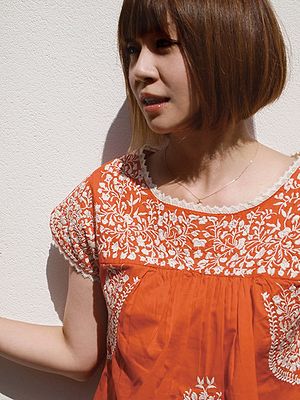
Hoshimura Mai (星村麻衣) is a Japanese pop-rock singer under Heart-Voice Records. She writes her own lyrics and composes her own music. Her style can be described as "piano-pop/rock". Hoshimura is also known for assuming a crouching stance while playing the piano.
Contents
Profile
- Name: Hoshimura Mai (星村麻衣)
- Birthdate: April 18th, 1981
- Birthplace: Shimane Prefecture, Japan
- Blood Type: AB
- Instrument: Piano
Information
Beginnings

Hoshimura Mai was born in Shimane Prefecture and majored in piano. She began playing when she was just four years old and considers the piano her friend. Her parents are both school teachers and were important to her development as a musician. Hoshimura's mother wanted her to become a classical musician while her father influenced her with his fondness for pop music (he played guitar in a pop-style band).
During high school, Hoshimura set her sights on becoming a singer-songwriter. She also developed a preference for pop-rock over classical music. One day, Hoshimura learned of a Sony Records vocalist audition on the Internet and submitted a demonstration tape. Although she passed the initial screening, she did not make the final cut since she was unable to attend an in-person audition because of her exams. Hoshimura did not give up however, and so she tried once again and passed. She released her debut indies single "Natsuiro no Canvas" in 2002.
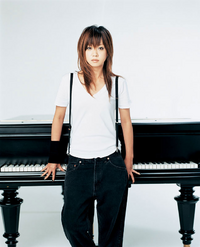
Going Major
Soon after the release of her indie debut, Hoshimura went major after being offered a record deal with Sony Music Entertainment. She made her major debut with the single, "Stay With You". She later released two more singles: "Cherish", which reached #125 on the Oricon and the more successful "GET HAPPY". "GET HAPPY" was used as the theme song for the drama Marusa!!, and reached #24 on the Oricon charts.
In 2005, "Melodea" is released and it marked the beginning of a notable change in Mai's music. With this single, though her vocals were still strong, Mai's compositions were much softer and subdued when compared to the upfront power and punch of her trademark 'piano-rock' sound. The following singles ("EVERY", "Sunao ni Narenai", "Merry Go Round") led up to her second studio album, "Joyful". The album did worse than her debut album, "SOUP", ranking at #60 on the Oricon charts.
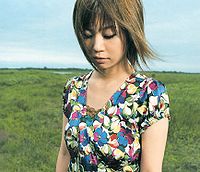
In 2007, Hoshimura started to rise to fame. "Sakura Biyori" was the tenth ending theme of the anime BLEACH, ranking #20 on the Oricon weekly charts. Her follow-up single, "Shunkan, Strobe.", failed to make the same impact.
On June 4th, 2008 Hoshimura made another hit, this time with "regret". The track was the seventh ending song of the anime D. Gray-man, ranking #30 on the Oricon weekly charts and selling 6,313 units totally. In the same year, Hoshimura released her most successful single to date, "Hikari", the theme song for the drama Tomorrow -Hi wa Mata Noboru-. The single reached #14 on the Oricon weekly charts, charted for 8 weeks and sold 21,313 units totally. After all success, Hoshimura released her third album entitled MY LIFE and it's also her most successful album to date, ranking #20 on the Oricon weekly charts.
Leaving Sony
In 2009, Hoshimura Mai along with the brilliant green and Sowelu, announced their departure from management agency Ken-On and record label Sony Music Entertainment. Before she left, Hoshimura still released a best album entitled PIANO & BEST. The collection consists of two discs: one features tunes sung to her own piano accompaniment, while the other includes all of her singles to date. The DVD contains a live concert footage of her Shibuya 2008.10.30 live. After the album's release, Hoshimura reportedly plans to hold several free concerts throughout Japan.
Discography
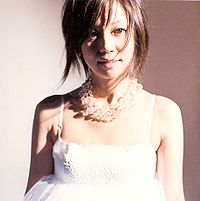

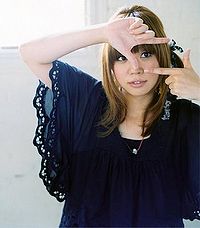

Albums
Best Albums
- [2009.03.11] PIANO & BEST
Mini-Albums
- [2010.12.01] Kyou ga Egao de Aru You ni (今日が笑顔であるように)
Singles
- [2002.07.07] Natsuiro no Canvas (夏色のキャンバス; Summer Coloured Canvas) (indies)
- [2002.10.23] Stay With You
- [2003.02.19] Cherish
- [2003.05.14] GET HAPPY
- [2003.12.03] Believer (ビリーヴァー)
- [2004.07.09] Himawari (ひまわり; Sunflower)
- [2005.03.16] Melodea
- [2005.05.25] EVERY
- [2005.09.28] Sunao ni Narenai (素直になれない; I Cannot Be Honest)
- [2006.01.11] Merry Go Round
- [2007.03.07] Sakura Biyori (桜日和; Cherry Blossom Weather)
- [2007.05.30] Shunkan, Strobe. (瞬間、ストロボ。; Moment, Strobe.)
- [2007.11.14] Kakegae no Nai Hito (かけがえのない人; Irreplaceable People)
- [2008.06.04] regret
- [2008.08.20] Hikari (ひかり; Light)
- [2010.03.10] Ichibanboshi (いちばん星; First Star To Appear In The Evening) (indies)
- [2010.07.29] Candy (indies)
- [2011.06.08] Doki Doki / YOU (indies)
Analog
- [2005.04.06] Melodea
- [2005.06.08] EVERY
- [2005.09.28] Sunao ni Narenai (素直になれない; I Cannot Be Honest)
Compilations / Other
- [2005.08.03] RELAXIN' WITH JAPANESE LOVERS VOLUME 4 (#3 Plastic Love)
- [2005.09.28] Diva (#12 Himawari)
- [2005.12.07] Koisuru Hanikami! Honey Coming LoveSongs (#12 Sunao ni Narenai)
- [2006.06.07] Mezamashi 39 (#5 Kazoku)
- [2006.06.21] Yakitate!! Japan Shudaikashu BEST Ban! (#8 Merry Go Round)
- [2007.09.26] TRIBUTE TO CELINE DION (#6 IT'S ALL COMING BACK TO ME NOW)
- [2008.09.24] D.Gray-man COMPLETE BEST (#40 regret)
- [2008.12.17] D.Gray-man Original Soundtrack 3 (#63 regret (TV size))
- [2008.12.17] BLEACH BEST TUNES (#3 Sakura Biyori)
- [2011.10.05] Return To ZERO (#8 Days)
External Links
| |||||||||||||||||||||||||||
